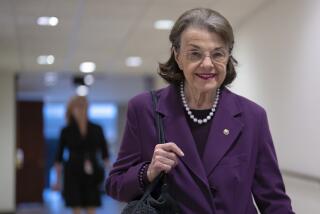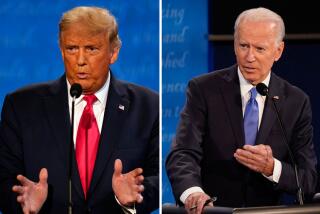Ginsburg Confirmed as 2nd Woman on Supreme Court
WASHINGTON — Swiftly and with remarkably little dissension, the Senate on Tuesday confirmed Ruth Bader Ginsburg’s appointment to the U.S. Supreme Court seat vacated by retired Justice Byron R. White, making her the 107th person, second woman and first Democratic presidential nominee in more than a quarter-century to ascend to the nation’s highest court.
By approving Ginsburg’s nomination on a 96-3 roll-call vote, the Senate completed the most agreeable Supreme Court confirmation process in recent history.
“I have only one word to say about this confirmation: ‘Great,’ ” said an exuberant Sen. Joseph R. Biden Jr. (D-Del.), who as chairman of the Judiciary Committee presided over the Ginsburg hearings. “It went so smoothly and that is just great to me.”
Ginsburg, 60, who earned notice as a crusading women’s rights advocate for the American Civil Liberties Union and became a moderate jurist during 13 years on the federal appellate bench, won praise during her confirmation hearings for her even temperament and judicial restraint.
“By any measure, she is qualified to become the Supreme Court’s ninth justice,” Senate Minority Leader Bob Dole (R-Kan.) said during floor debates on the nomination.
Only three conservative lawmakers--Jesse Helms (R-N.C.), Don Nickles (R-Okla.) and Robert C. Smith (R-N.H.)--voted against her nomination, apparently out of concern for her abortion rights stance. Democratic Sen. Donald W. Riegle Jr. of Michigan was absent.
White House officials said Ginsburg would be sworn in next week, possibly Tuesday, in ceremonies at the White House and the Supreme Court. She did not witness the Senate action, officials said.
Ginsburg appeared briefly with President Clinton in the White House Rose Garden late in the day. He said the newest justice will have “the opportunity to move the court not left or right, but forward.”
Ginsburg promised: “I’ll do the very best I can in this job.” She also visited the Supreme Court to plan for her swearing-in by Chief Justice William H. Rehnquist.
Her voice will be added to a Supreme Court that has moved sharply to the right since the last time a Democratic President made such an appointment.
In her confirmation hearings, she promised not to bring an ideological bias to the court but expressed opinions on several issues that put her at odds with some of her new conservative colleagues. For example, Ginsburg acknowledged support for a woman’s right to choose an abortion, praised the failed equal rights amendment and criticized discrimination against homosexuals.
Her support for abortion rights stands in marked contrast to the opinions issued by White, an ardent abortion opponent.
Clinton, in a statement read by Press Secretary Dee Dee Myers, thanked the senators for their “swift and determined” endorsement of his nominee. “As President, I am proud of having nominated such an outstanding jurist who demonstrated in the confirmation process tremendous intellect, integrity, comprehension of the law and compassion for the concerns of all Americans,” Clinton’s statement read. “I am confident that she will be an outstanding addition to the court and will serve with distinction for many years.”
With the Senate’s vote, Clinton made history as the first Democratic President to have his choice confirmed by the Senate since 1968, when President Lyndon B. Johnson successfully nominated Thurgood Marshall Jr.
Since then, four Republican presidents have named nine justices to lifetime appointments. One of them, President Ronald Reagan’s 1981 nominee, Sandra Day O’Connor, was the first woman seated on the high court. President Jimmy Carter, the only Democrat to serve in the White House from 1968 until Clinton took office, did not have an opportunity to choose a Supreme Court justice.
By choosing Ginsburg, Clinton made good on his campaign promise to avoid the kind of contentiousness that characterized President George Bush’s nomination of conservative judge Clarence Thomas to the high court. Ginsburg encountered virtually no hostile fire from senators and her nomination moved with ease through a Senate Judiciary Committee composed of many legislators who had participated in the vitriolic debates surrounding Thomas and ill-fated Reagan Administration nominee Robert H. Bork.
In other actions, the Senate voted, 72 to 27, to approve Clinton’s controversial nominations of Thomas Payzant, superintendent of public schools in San Diego, as his assistant secretary of education in charge of elementary and secondary school policy, and voted, 76 to 23, to confirm Sheldon Hackney, former president at the University of Pennsylvania, as chairman of the National Endowment for the Humanities.
In both cases, conservative senators raised questions about how liberal the nominees would be in executing their duties. In Payzant’s case, some lawmakers were alarmed by his decision forbidding the Boy Scouts of America to meet in San Diego’s public schools during school hours. Payzant acted because of the youth organization’s policy against homosexuals. As for Hackney, the senators raised questions about his views on free speech and diversity while serving at the university.
Conservative senators were successful, however, at least temporarily, in blocking Joycelyn Elders’ confirmation as surgeon general. Led by Nickles, Elders’ opponents put a hold on her confirmation vote to express their displeasure with her support for abortion rights, sex education and condom distribution in schools. Although she is expected ultimately to be confirmed, the delay likely will prevent her from being seated until after the Senate’s August recess.
Meanwhile, the Senate Judiciary Committee’s 18 members unanimously approved the choice of Louis J. Freeh as director of the Federal Bureau of Investigation.
More to Read
Get the L.A. Times Politics newsletter
Deeply reported insights into legislation, politics and policy from Sacramento, Washington and beyond. In your inbox three times per week.
You may occasionally receive promotional content from the Los Angeles Times.










